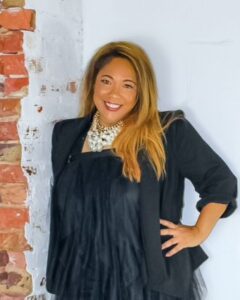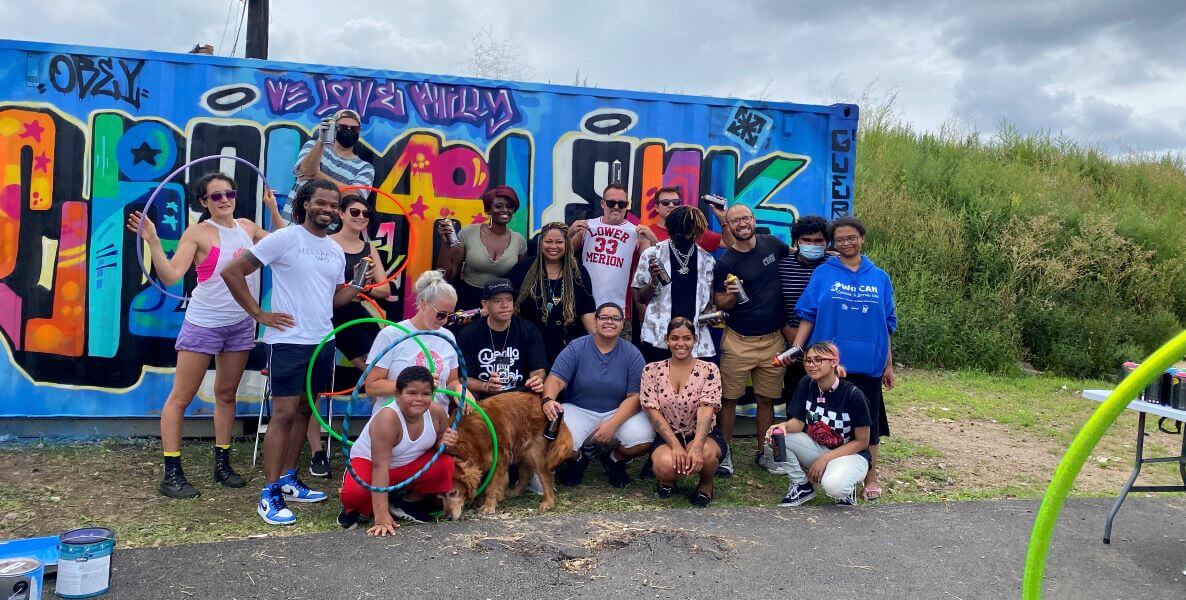Growing up in Philadelphia’s Germantown neighborhood, Karla Ballard truly felt like she was raised by a village.
Her Aunt Linda made dinner every Sunday for the family. Her grandmother rallied the block to advocate for a stop sign. Countless neighbors made meals or watched children when community members needed a helping hand.
“Growing up in Germantown, for me, was about growing up around a tribe of people and feeling so locked into the community,” she says.
It’s an ethos that has followed her from Philly to Washington, D.C. to Los Angeles, as she worked in banking, nonprofit organizing, and advocacy for broadband access and digital literacy. In her work, she constantly saw how willing people were to help one another. She thought maybe this could be a business?
Ballard is monetizing the idea of time banking, inviting organizations to increase their value by turning their members, workers, or residents into a community that functions well because it functions much like Ballard’s childhood neighbors did — by helping each other.
Today, Ballard is back in Philly, getting ready to launch YING 3.0, the latest version of an app that helps community members share skills to complete tasks — like water a plant or walk a dog, or, design a logo or apply for grants — to help one another.
With YING, Ballard is monetizing the idea of time banking and inviting organizations to increase their value by turning their members, workers, or residents into a community that functions well because it functions much like Ballard’s childhood neighbors did — by helping each other. So far, YING has raised $1.3 million to support its development, and plans to release YING 3.0 this fall.
An online village
The idea for YING came to Ballard 20 years ago. She was living in Washington, aiding executives with corporate social responsibility initiatives. The role introduced her to the concept of time banking. Developed by the late Dr. Edgar Cahn, time banking is the idea that community members can exchange services with one another, trading a home-cooked dinner for picking up litter, for instance. Cahn went on to create the inter-community skill-sharing nonprofit TimeBanksUSA.
The practice reminded Ballard of how she grew up, but she wasn’t quite sure it could be a business yet. So she stayed in D.C., kept working. Her job to help expand broadband access in America, led to expanding the digital literacy program with the Boys and Girls Club of America, and, later, assessing content in Hollywood. But the idea of a business that promoted community skill sharing stayed in the back of her mind.
She’d been living in L.A. for almost nine years when she noticed things were starting to change. The city was bursting with young tech entrepreneurs — so many, Ballard jokes, the area was nicknamed “Silicon Beach.” It was 2015, and Platforms like Uber, DoorDash and Lyft were taking off; everyone was buzzing about the sharing economy. Ballard wondered if skill sharing could be part of the moment, too.
“I thought, are we shifting as a culture to potentially get back to our roots?” Ballard says. “Because when we lived in a village, that was just natural.”
She started developing an early version of YING while still in L.A. The initial software was together by 2017. She even got a call from then-Secretary of Housing and Urban Development Ben Carson to discuss the app’s potential for use in public housing developments.
Then, she got a call from family. A relative, a combat veteran, was struggling with PTSD. Her family needed support. Ballard paused her work on the app and returned home to help out.
Being back, surrounded once again by neighbors and family members who were always willing to lend a hand, reinforced to her the need for YING.
In Philadelphia, she went to an event put on by Global Village (GLBL VLLG), a citywide community for artists and creatives. The event, which GLBL VLLG calls a “jam,” featured open mics and opportunities for artists to meet and collaborate on various projects. It was there that she met Leonzo Vargas, GLBL VLLG’s executive director. The two got to talking and found common ground.
“We really share a similar vision for society,” Vargas says. “YING provides this sense of supporting one another’s skills and efforts and things of that sort in a communal way.”
This was back in 2019, before Covid turned the world upside down. For Ballard and Vargas, the pandemic exposed just how much communities rely on one another. Later, when they saw neighbors band together to protest the murder of George Floyd, they knew Philly was a community where YING could flourish.
For each group, the team leader, typically a small business, nonprofit, or community organizer, pays a fee — starting at $150 per month for the first six months for organizations with 500 skill-sharing members.
For Ballard, it wasn’t just Philly’s neighborhood ethos: Her family can trace their heritage back to Aaron Burr, and she traces the city’s legacy of innovation from the writing of the Constitution to locally-founded Venmo and GoPuff.
Vargas and Ballard formed a partnership wherein Vargas and GLBL VLLG would help Ballard imagine how YING could be put to use and helped create videos explaining how the app works, and YING would help GLBL VLLG members connect and support one another.
With the help of Vargas, GLBL VLLG, and a grant from the Knight Foundation, Ballard held a community skill-sharing event in Germantown in 2020. Nonprofits, veterans groups, artists and urban farmers came out to learn how YING could help them help each other. The interest was there. Ballard launched a beta version of YING alongside GLBL VLLG at a REC Philly event in 2021.
How it works

YING operates under a software as a service (SAAS) business model. The app has various groups — Professional Services, Help at Home, Ridesharing, Women of Vision, Black and Asian Solidarity, Family, etc. For each group, the team leader, typically a small business, nonprofit, or community organizer, pays a fee — starting at $150 per month for the first six months for organizations with 500 skill-sharing members.
The service is free to individual members. So, an apartment complex could pay for a group in which its tenants sign up to help each other out, or a nonprofit could purchase one to organize their volunteers. The app currently has close to 65 beta users.
When you download YING, you’re prompted to enter codes of the groups you want to join, then, you can start completing tasks. Each group member begins with 24 balance tokens, representing the number of hours in each day. These tokens can be used in exchange for completing tasks ranging from the simple — weeding a neighbor’s garden, bringing in their mail — to more complex, like website design. Complete a task; earn more balance tokens. Assign a task, and give them a balance token or two.
YING’s beta version also has a tip jar to offer additional monetary payment for work; YING 3.0 will allow users to post gigs for money (or cryptocurrency) and pay within the app. The inclusion of monetary payments will allow users who are out of tokens to continue posting tasks, and will allow small businesses, nonprofits or other organizations to further compensate workers. In this way, YING is a bit like Fiverr or Taskrabbit.
Ballard has seen users engage in a wide range of tasks. Younger users, especially those working from home, have used YING to connect with older mentors nearby, for life and professional advice. She has had success recruiting Philly nonprofits, activists and mission-driven small businesses — such as Circular Philadelphia and Miles Orion Butler of Germantown Espresso — as beta testers. For them, YING has answered the need for help to complete everyday operational tasks due to nationwide talent shortages.
“I wanted to turn my exhibit into an arts center with art therapy and mental health resources,” Lomax says, and Fisher “has been supportive of everything … Without YING, I wouldn’t have been able to meet her.”
One such artist and activist who tried out YING is Zarinah Lomax, host of The Zarinah Lomax Show podcast and curator of We Are Here – Stories of Expressions, a 27-artist exhibit of stories of victims of violence now on display at City Hall. As she was working on the exhibit, Lomax found that she needed operational support and, through YING, found Fatima Fisher, a business coach with SCORE.
Fisher helped Lomax plan the opening and find and apply to grant programs. Now, Fisher has transitioned into more of a mentorship role. She’s helped take Lomax’s project from an exhibit into The Apologues, a nonprofit that provides mental health resources.
“I wanted to turn my exhibit into an arts center with art therapy and mental health resources,” Lomax says, and Fisher “has been supportive of everything … Without YING, I wouldn’t have been able to meet her.”
It worked so well, Lomax invited a friend who runs a holistic health business to join YING. That friend found mentorship through the Black and Asian solidarity group. This is how Ballard intends YING to work. She wants to build community.
While YING, which has 11 employees, is not yet profitable, it already has a waitlist for YING 3.0 and monthly, in-person skill-sharing intro events planned, starting September 21 at Kismet Coworking in Manayunk.
Ballard plans to continue to grow the app locally first then would love to see the business take off in other cities.
“If you want to start this in Biloxi, Mississippi, if you want to start this in rural America … We’re going to have a beautiful template for you to just begin to gather people,” she says. “I don’t even call this a product or a software, I call this a lifestyle.”
![]() MORE BUSINESSES FOR GOOD FROM THE CITIZEN
MORE BUSINESSES FOR GOOD FROM THE CITIZEN
Karla Ballard with Global Village and community members. Photo courtesy YING



